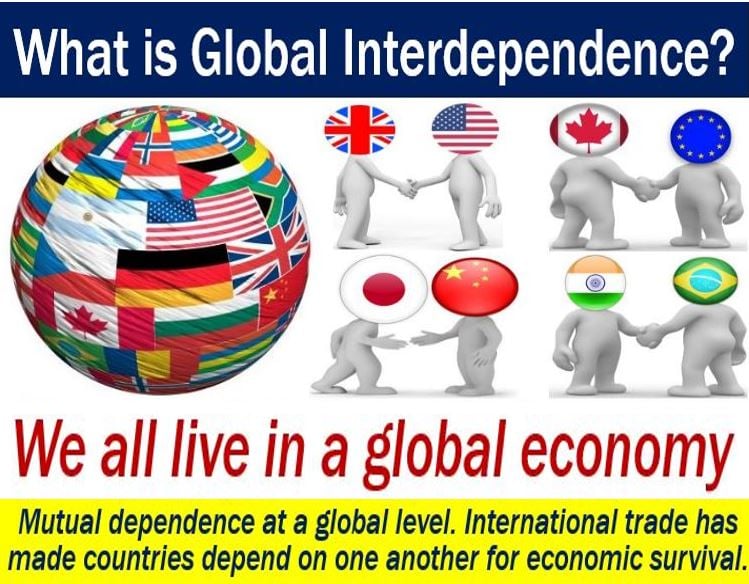What is global interdependence?
Global Interdependence refers to worldwide mutual dependence between countries. In other words, mutual dependence at a worldwide level. One nation depends on another for something. That country also depends on another for either the same thing or something else. As more countries depend on other nations for things, especially key things like energy and food, global interdependence evolves.
Global interdependence is largely the result of international trade, i.e., the importing and exporting of products and services. In fact, countries today cannot survive for long without each others’ imports and exports.
International organizations play a pivotal role in navigating the complexities of global interdependence, fostering cooperation to mitigate risks associated with reliance on foreign commodities and services.
Oil and natural gas have created global interdependence between the major producing nations and those that do not have enough.
BusinessDictionary.com has the following definition of the term:
“Mutual dependence at a global level. One country depends on another country for something and that country may depend on another country, which eventually creates global interdependence. Importing and exporting of goods and services highly contributes to global interdependence.”
Global interdependence – a current reality
No country can be totally self-sufficient. In today’s global economy, a need exists for international trade.
Nations and their citizens would not voluntarily trade with other countries unless there were benefits from this exchange.
A consequence of this decision to import and export is that today we can produce more goods efficiently. We can also use resources more efficiently.
Moreover, the environmental impact of global trade is becoming a critical factor, with nations recognizing the need to address ecological concerns as part of their interdependent economic activities.
Put simply; international trade increases material standards of living across the world, i.e., it makes us richer.

As international trade evolves, countries that are more efficient in certain things begin to specialize. In other words, they focus on making specific goods or offering certain services.
Those specializing countries subsequently need to import. They need to import because some sectors have contracted as more resources went to making certain goods.
As more and more countries specialize, the need for imports also grows. Consequently, today no country can survive without trading with other nations.
Hence, global interdependence has become a fact of life for everybody.
The global economy and global interdependence
The global economy refers to all the economies of the world. Specifically, it refers to how countries’ economies have been developing and operating collectively as one giant system.
If you say “We live in a global economy,” what does it mean?
It means that we live in a world comprising many economies that depend on each other. They are intertwined and interdependent. In other words, they all operate like different parts of one unit. That one unit is the global economy.
The global economy has many advantages. By specializing and trading with other countries, nations become richer.
However, global interdependence also has some disadvantages. For example, what happens if your country depends on another for oil, and its leader decides to stop selling to you? What happens to your country if the other country suddenly doubles the price of oil?
Countries that depend on other nations are also vulnerable. Especially if they rely on other nations for strategic goods like fuel or food.
Global interdependence vs. globalization
The terms ‘Global Interdependence’ and ‘Globalization’ are closely related, but not identical.
While global interdependence refers to the mutual reliance between countries, globalization is more about the process by which organizations, mainly businesses, develop international influence.
When a company starts operating on an international scale, we are looking at an example of globalization. Globalization encompasses the flow of people, goods, information, and ideas internationally, i.e., across international borders.
-
A state vs, the process
One of the consequences of globalization is global interdependence. We could say that global interdependence is a state of being reliant on other countries, while globalization is the process of reaching that state.
Video – What is Global Interdependence
This interesting video presentation, from our sister YouTube channel – Marketing Business Network, explains what ‘Global Interdependence’ is using simple and easy-to-understand language and examples.

